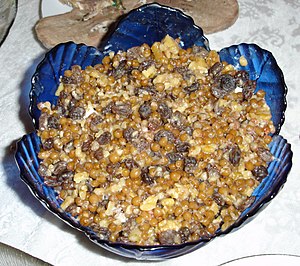This article needs additional citations for verification. (March 2013) |
 Koliva from wheat seeds with raisins | |
| Alternative names | Kollyva, Colivă, Funeral Cake |
|---|---|
| Type | Ritual food |
| Main ingredients | Wheat kernels, honey or sugar |
Koliva, also spelled, depending on the language, kollyva, kollyba, kolyvo, or colivă,[a] is a dish based on boiled wheat that is used liturgically in the Eastern Orthodox Church for commemorations of the dead.
In the Eastern Orthodox Church, koliva is blessed during funerals, as well as during the memorial service (mnemosyno) that is performed at various intervals after a person's death and on special occasions, such as the Saturday of Souls (ψυχοσάββατο). It may also be used on the first Friday of Great Lent,[1] at Slavas, or at mnemosyna in the Christmas meal. In some countries, though not in Greece (and Cyprus), it is consumed on nonreligious occasions as well.
A similar food item is widely popular in Lebanon where it is known as snuniye and, more commonly, as berbara as it is prepared for Saint Barbara's feast day, December 4, which is celebrated with Halloween-like festivities.
Cite error: There are <ref group=lower-alpha> tags or {{efn}} templates on this page, but the references will not show without a {{reflist|group=lower-alpha}} template or {{notelist}} template (see the help page).
- ^ "1st Saturday of Great Lent St Theodore the Recruit". Retrieved 2007-03-02.